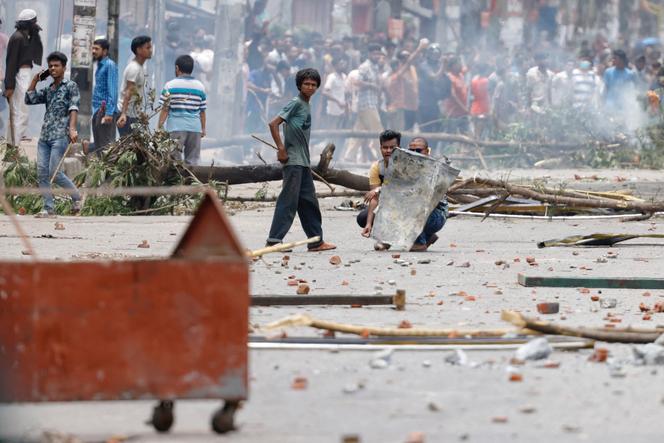


Prime Minister Sheikh Hasina's government announced a nationwide curfew across Bangladesh on Friday, July 19, and ordered the deployment of military forces to maintain order following days of deadly clashes over the allocation of government jobs.
The announcement was made by Obaidul Quader, the general secretary of the ruling Awami League party, and came after police and security officials fired on protesters Friday and banned all gatherings in the capital. Several people were killed, media reports said. Quader said the military was deployed to help the civilian administration keep order.
The protests, which began weeks ago but escalated sharply this week, represent the biggest challenge to Prime Minister Sheikh Hasina since she won a fourth consecutive term in office after elections in January. Main opposition groups boycotted those polls.
There were varying reports of the number of people killed Friday, with Independent Television reporting 17 dead and Somoy TV reporting 30. An Associated Press reporter saw 23 bodies at Dhaka Medical College and Hospital, but it was not immediately clear whether they had all died on Friday.
A death toll of 22 people was reported on Thursday, in what had so far been the bloodiest day of demonstrations , according to local media, as protesting students attempted to impose a "complete shutdown" of the country.
The government has deployed police and paramilitary forces across the capital to lock down campuses and break up protests. On Wednesday, universities including the country's largest suspended classes and closed dormitories, and on Friday police in Dhaka said they were banning all gatherings and demonstrations in the capital.
UN human rights chief Volker Turk said the attacks on student protesters were "shocking and unacceptable." "There must be impartial, prompt and exhaustive investigations into these attacks, and those responsible held to account," he said in a statement.
The capital's police force earlier said protesters had on Thursday torched, vandalized and carried out "destructive activities" on numerous police and government offices. Among them was the Dhaka headquarters of state broadcaster Bangladesh Television, which remains offline after hundreds of incensed students stormed the premises and set fire to a building.
Near-daily marches this month have called for an end to a quota system that reserves more than half of civil service posts for specific groups, including children of veterans from the country's 1971 liberation war against Pakistan.
Critics say the scheme benefits children of pro-government groups that back Hasina, 76, who has ruled the country since 2009 and won her fourth consecutive election in January after a vote without genuine opposition.
Hasina's government is accused by rights groups of misusing state institutions to entrench its hold on power and stamp out dissent, including by the extrajudicial killing of opposition activists. Her administration this week ordered schools and universities to close indefinitely as police stepped up efforts to bring the deteriorating law and order situation under control.
London-based watchdog NetBlocks said Friday that a "nation-scale" internet shutdown remained in effect a day after it was imposed. "Metrics show connectivity flatlining at 10% of ordinary levels, raising concerns over public safety as little news flows in or out of the country," it wrote on social media platform X.
Students say they are determined to press on with protests despite Hasina giving a national address earlier this week on the now-offline state broadcaster seeking to calm the unrest. Nearly half of Bangladesh's 64 districts reported clashes on Thursday, broadcaster Independent Television reported.
